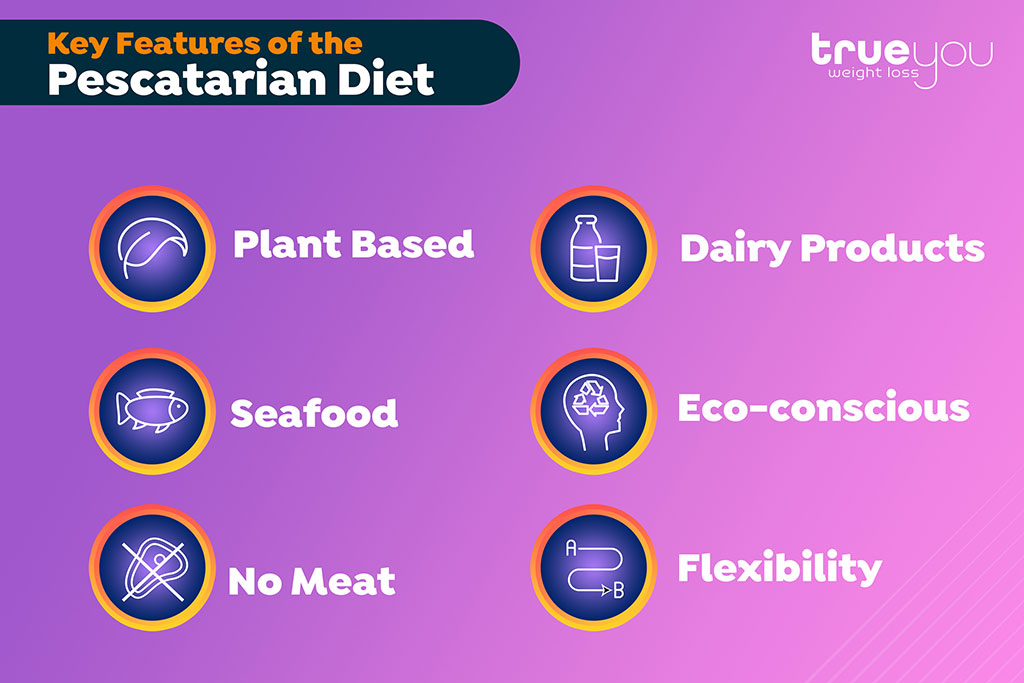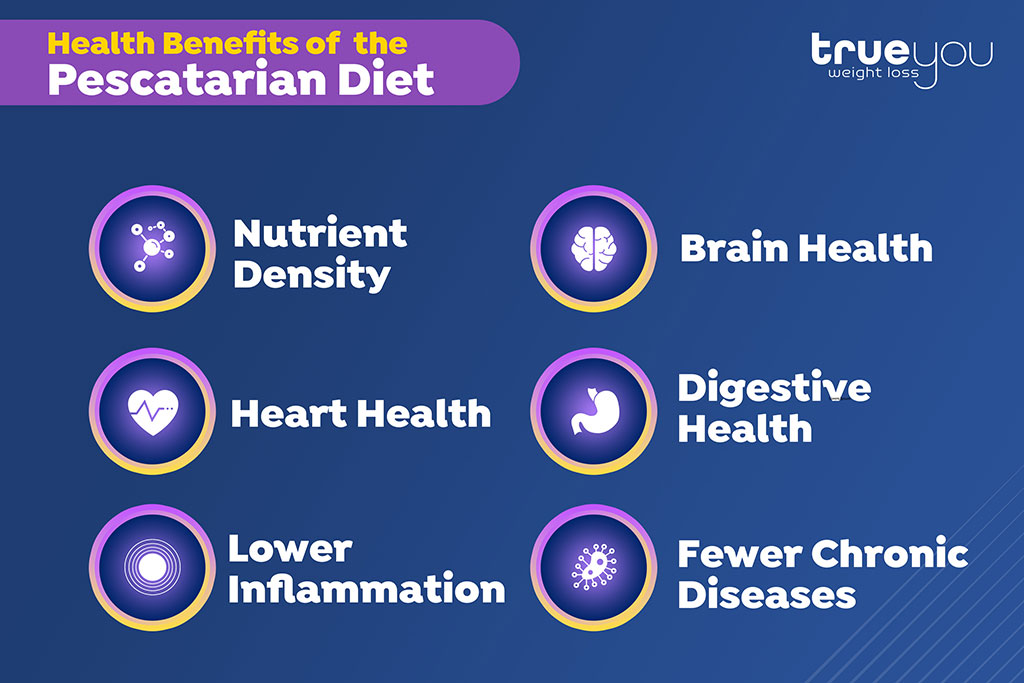Origin of the Pescatarian Diet | How Does the Pescatarian Diet Work? | Benefits of a Pescatarian Diet? | Environmental Impact of the Pescatarian Diet? | Pescatarian Diet Lead to Weight Loss? | What Do the Experts Say? | Bottom Line
Dieting for most people is usually a way to either lose weight or avoid gaining weight. For others, though, a chosen diet is about living a healthier life or aligning one’s lifestyle choices with a set of core beliefs. A great example of a diet like this is the pescatarian diet, a unique and increasingly popular dietary pattern that offers a fusion of plant-based foods and seafood. The pescatarian lifestyle, characterized by its emphasis on sustainability and overall health, may appeal to people with certain beliefs, but the diet itself has merit as a way to lose weight as well.
The history of the pescatarian diet can be traced back to Classical Greece, where at the time it was essentially synonymous with vegetarianism. In the centuries since then, various cultures and prominent figures have advocated for a meatless diet for a number of different reasons, including the perception that eating fish and vegetables is a fundamentally more healthy option. Health wasn’t always a factor, though; in Japan, for instance, the consumption of meat from livestock was banned and remained absent from the Japanese diet for over 1200 years because of growing Buddhist influences.
In many cultures that developed along coasts or on islands, the population tended toward a pescatarian lifestyle more out of necessity than choice, however. In more recent history, the overlap between pescatarian and vegetarian diets has continued, in large part because of the idea that fish and other types of seafood don’t count as “meat.” These days, the pescatarian diet is closely related to other diets like the flexitarian diet and the Mediterranean diet. The common feature they all share is that they are derived from real-world examples of diet being a key component of an overall healthy lifestyle.

The most basic definition of the pescatarian diet is a primarily plant-based diet that incorporates fish and other seafood as a source of animal protein. In fact, many pescatarians may even identify as vegetarians who only occasionally eat fish. While there isn’t a specific pescatarian diet plan or system, there are a few principles and key features that set it apart:

As scientists have continued to research the ways our diet can affect our body, it has become clear that some eating patterns are more healthy than others. The typical American diet, for example, tends to be high in refined carbs, saturated fat, and cholesterol, which are all factors that raise the risk for heart disease, obesity, and other related conditions. The pescatarian diet, on the other hand, emphasizes whole, unprocessed foods and offers similar health benefits as the Mediterranean diet, the DASH diet, and the MIND diet. Below is an overview of these health benefits:
One of the other major reasons people advocate for the pescatarian diet is because of its potential lower impact on the environment. Though there are some ways the impact can be negative (overfishing, water contaminants, or habitat damage, for example), there are several aspects of fishery practices that make them better for the environment when compared to animal agriculture:
Like the Mediterranean diet and other meal plans that are primarily concerned with health, the pescatarian diet might not be a person’s first choice for weight loss. Nevertheless, there is evidence that an eating pattern defined by pescetarianism can be helpful for losing weight or maintaining a healthy weight. There haven’t been many studies specifically on whether the pescatarian diet leads to weight loss, but there has been a lot of research that shows how shifting to a diet based around plant-based foods and lean proteins like fish can promote a calorie deficit in some people.
Indeed, fish consumption in the pescatarian diet is one of the main reasons it can be helpful for weight loss. In the typical American diet, red meat and pork are common, but they also are both high in saturated fat and calories. So even though they are good sources of protein (an important macronutrient when trying to lose weight), the amount of fat and cholesterol make them unhealthy to eat on a regular basis. But fish and many other types of seafood are relatively low in calories at the same time as being loaded with protein; they also contain omega-3 fatty acids and other nutrients that make them filling and beneficial for other aspects of health.
In general, a diet that is high in fiber and protein and low in fat and sugar is going to be ideal for weight loss goals. With the pescatarian diet, the lean proteins from fish and plentiful fiber from plant foods makes it well positioned to create a calorie deficit. As with any kind of diet that is being used for weight loss, though, the ability to actually lose weight is entirely dependent on daily food choices. With the right planning and discipline, the pescatarian diet can be a sustainable way to maintain a healthy weight.
Kathleen Walton, MS, RD, LDN, a registered dietitian at True You Weight Loss, offers some insight into commonly asked questions about the pescatarian diet:
What are the pros and cons of the pescatarian diet? What type of people may benefit from this diet and who should avoid?
What have you found people are generally unaware of when considering the pescetarian diet?
Do you have firsthand experience with the pescatarian diet, whether it’s something that you've personally tried, or have seen others be successful or unsuccessful with?
How much weight do people typically lose with the pescetarian diet?
For someone that might be considering the pescetarian diet what alternative options should they consider and why?
The pescatarian diet, which is essentially a plant-based diet combined with some seafood, is ultimately a heart-healthy and nutrient-rich eating plan. It shares a number of core tenets with other well-regarded diets like DASH, MIND, and the Mediterranean diet. While not specifically intended for weight loss, a pescatarian way of eating can be a useful framework for a weight management plan. The bottom line is that the emphasis on whole, minimally processed, whole foods and lean proteins makes it a great option for some people.
As noted, the pescatarian diet may help some people lose weight, but it will probably only be effective if you enjoy eating seafood. In other words, there isn’t anything magical about the pescatarian diet or any other diet that promotes weight loss. An effective diet plan only works if the person using the plan can realistically follow the diet consistently. But if you’re going to hate the food, there’s a much higher likelihood of abandoning the diet and going back to eating more calories than the body needs.
This dynamic illustrates why weight loss is so hard for most people: because there are numerous factors that lead to weight gain and numerous factors that can be an obstacle to weight loss. In fact, various studies over the years have consistently shown that most (around 80%) people who lose weight through traditional methods like dieting and exercise end up regaining a significant portion of that weight within 12-24 months. This suggests that the specific diet a person selects is less important than sticking with whatever the chosen diet is.
Given the difficulties involved in losing weight, and the demonstrated lack of effectiveness of dieting, it might be tempting to throw your hands up in frustration. But even though many Americans haven’t found their way to sustainable weight loss doesn’t mean it’s actually impossible. Fortunately, advances in endobariatric surgery have provided new weight loss options that weren’t previously available, and there are a lot of people who are eligible for such procedures but who don’t take advantage of it.
At True You Weight Loss, we know how challenging a weight loss journey can be. That is why we specialize in the latest non-surgical endobariatric procedures like endoscopic sleeve gastroplasty (ESG); with a short, minimally invasive procedure, you can be well on your way to the kind of long-term weight loss that once seemed unimaginable. If you’d like to learn more about ESG or any other alternative weight loss options, please contact us today to request a consultation. Freedom is waiting!

Dr. Christopher McGowan, MD, a leader in endobariatrics, specializes in non-surgical obesity treatments and is triple-board-certified in Internal Medicine, Gastroenterology, and Obesity Medicine. Renowned for pioneering endoscopic sleeve gastroplasty (ESG) with over 2,000 procedures, his global influence and research contributions define him as a top expert.



